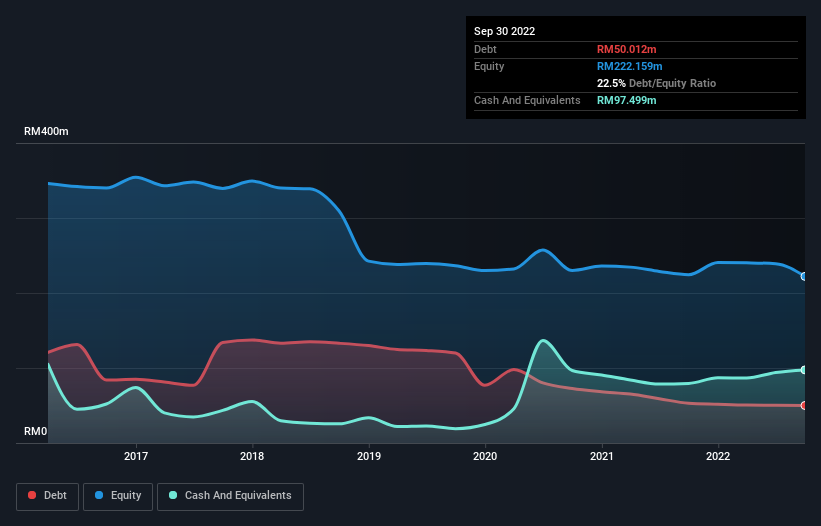Here's Why ILB Group Berhad (KLSE:ILB) Can Manage Its Debt Despite Losing Money

The external fund manager backed by Berkshire Hathaway's Charlie Munger, Li Lu, makes no bones about it when he says 'The biggest investment risk is not the volatility of prices, but whether you will suffer a permanent loss of capital.' It's only natural to consider a company's balance sheet when you examine how risky it is, since debt is often involved when a business collapses. We can see that ILB Group Berhad (KLSE:ILB) does use debt in its business. But should shareholders be worried about its use of debt?
What Risk Does Debt Bring?
Debt assists a business until the business has trouble paying it off, either with new capital or with free cash flow. If things get really bad, the lenders can take control of the business. While that is not too common, we often do see indebted companies permanently diluting shareholders because lenders force them to raise capital at a distressed price. Having said that, the most common situation is where a company manages its debt reasonably well - and to its own advantage. The first step when considering a company's debt levels is to consider its cash and debt together.
See our latest analysis for ILB Group Berhad
What Is ILB Group Berhad's Debt?
The image below, which you can click on for greater detail, shows that ILB Group Berhad had debt of RM50.0m at the end of September 2022, a reduction from RM53.0m over a year. However, it does have RM97.5m in cash offsetting this, leading to net cash of RM47.5m.

A Look At ILB Group Berhad's Liabilities
Zooming in on the latest balance sheet data, we can see that ILB Group Berhad had liabilities of RM38.0m due within 12 months and liabilities of RM26.0m due beyond that. Offsetting this, it had RM97.5m in cash and RM10.3m in receivables that were due within 12 months. So it actually has RM43.8m more liquid assets than total liabilities.
This surplus strongly suggests that ILB Group Berhad has a rock-solid balance sheet (and the debt is of no concern whatsoever). Having regard to this fact, we think its balance sheet is as strong as an ox. Simply put, the fact that ILB Group Berhad has more cash than debt is arguably a good indication that it can manage its debt safely. The balance sheet is clearly the area to focus on when you are analysing debt. But it is ILB Group Berhad's earnings that will influence how the balance sheet holds up in the future. So when considering debt, it's definitely worth looking at the earnings trend. Click here for an interactive snapshot.
In the last year ILB Group Berhad wasn't profitable at an EBIT level, but managed to grow its revenue by 149%, to RM22m. So there's no doubt that shareholders are cheering for growth
So How Risky Is ILB Group Berhad?
While ILB Group Berhad lost money on an earnings before interest and tax (EBIT) level, it actually booked a paper profit of RM426k. So taking that on face value, and considering the cash, we don't think its very risky in the near term. We think its revenue growth of 149% is a good sign. We'd see further strong growth as an optimistic indication. There's no doubt that we learn most about debt from the balance sheet. However, not all investment risk resides within the balance sheet - far from it. For example - ILB Group Berhad has 3 warning signs we think you should be aware of.
If you're interested in investing in businesses that can grow profits without the burden of debt, then check out this free list of growing businesses that have net cash on the balance sheet.
If you're looking to trade Nuenergy Holdings Berhad, open an account with the lowest-cost platform trusted by professionals, Interactive Brokers.
With clients in over 200 countries and territories, and access to 160 markets, IBKR lets you trade stocks, options, futures, forex, bonds and funds from a single integrated account.
Enjoy no hidden fees, no account minimums, and FX conversion rates as low as 0.03%, far better than what most brokers offer.
Sponsored ContentValuation is complex, but we're here to simplify it.
Discover if Nuenergy Holdings Berhad might be undervalued or overvalued with our detailed analysis, featuring fair value estimates, potential risks, dividends, insider trades, and its financial condition.
Access Free AnalysisHave feedback on this article? Concerned about the content? Get in touch with us directly. Alternatively, email editorial-team (at) simplywallst.com.
This article by Simply Wall St is general in nature. We provide commentary based on historical data and analyst forecasts only using an unbiased methodology and our articles are not intended to be financial advice. It does not constitute a recommendation to buy or sell any stock, and does not take account of your objectives, or your financial situation. We aim to bring you long-term focused analysis driven by fundamental data. Note that our analysis may not factor in the latest price-sensitive company announcements or qualitative material. Simply Wall St has no position in any stocks mentioned.
About KLSE:NHB
Nuenergy Holdings Berhad
An investment holding company, operates solar power plants primarily in Malaysia.
Moderate with adequate balance sheet.
Market Insights
Community Narratives



